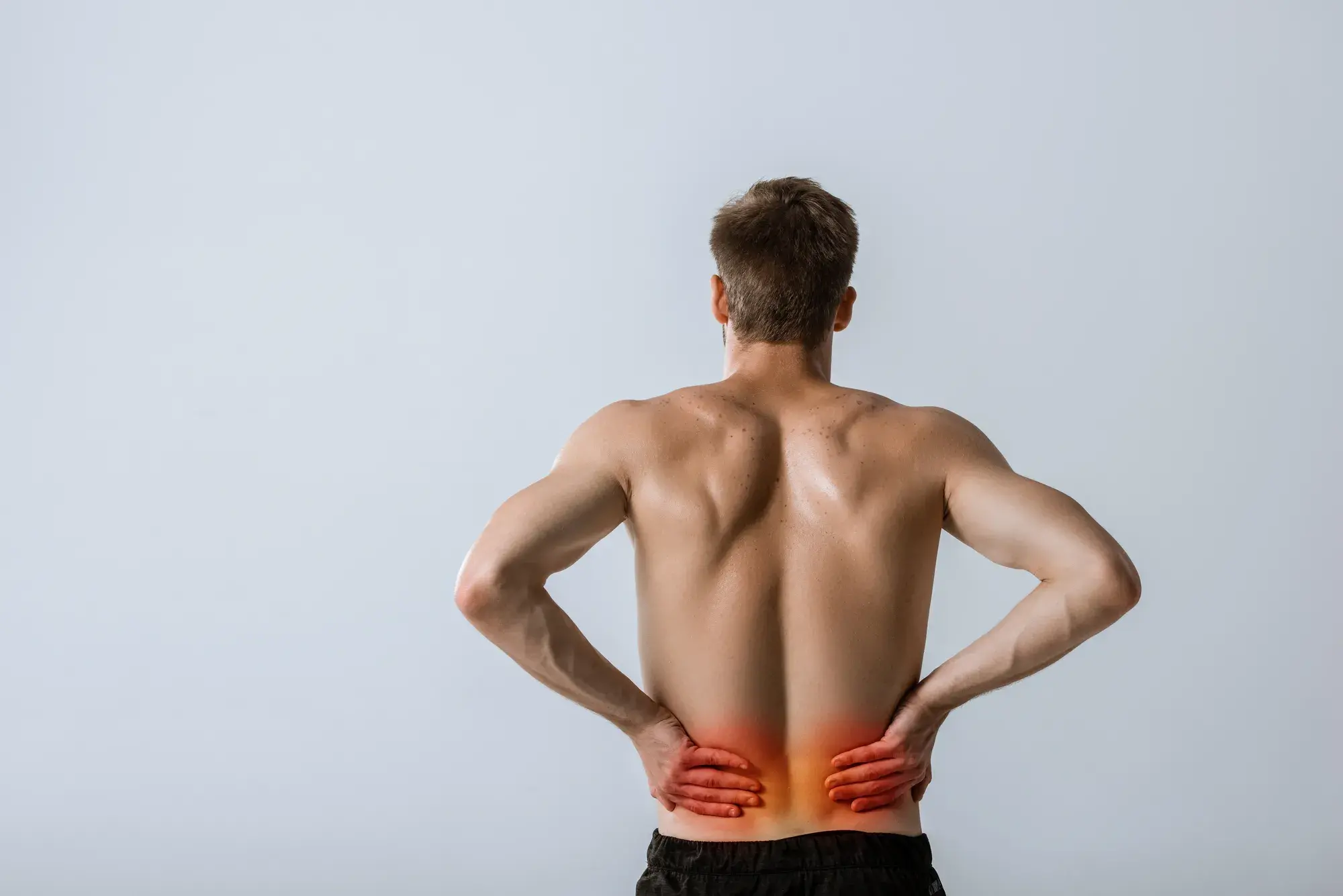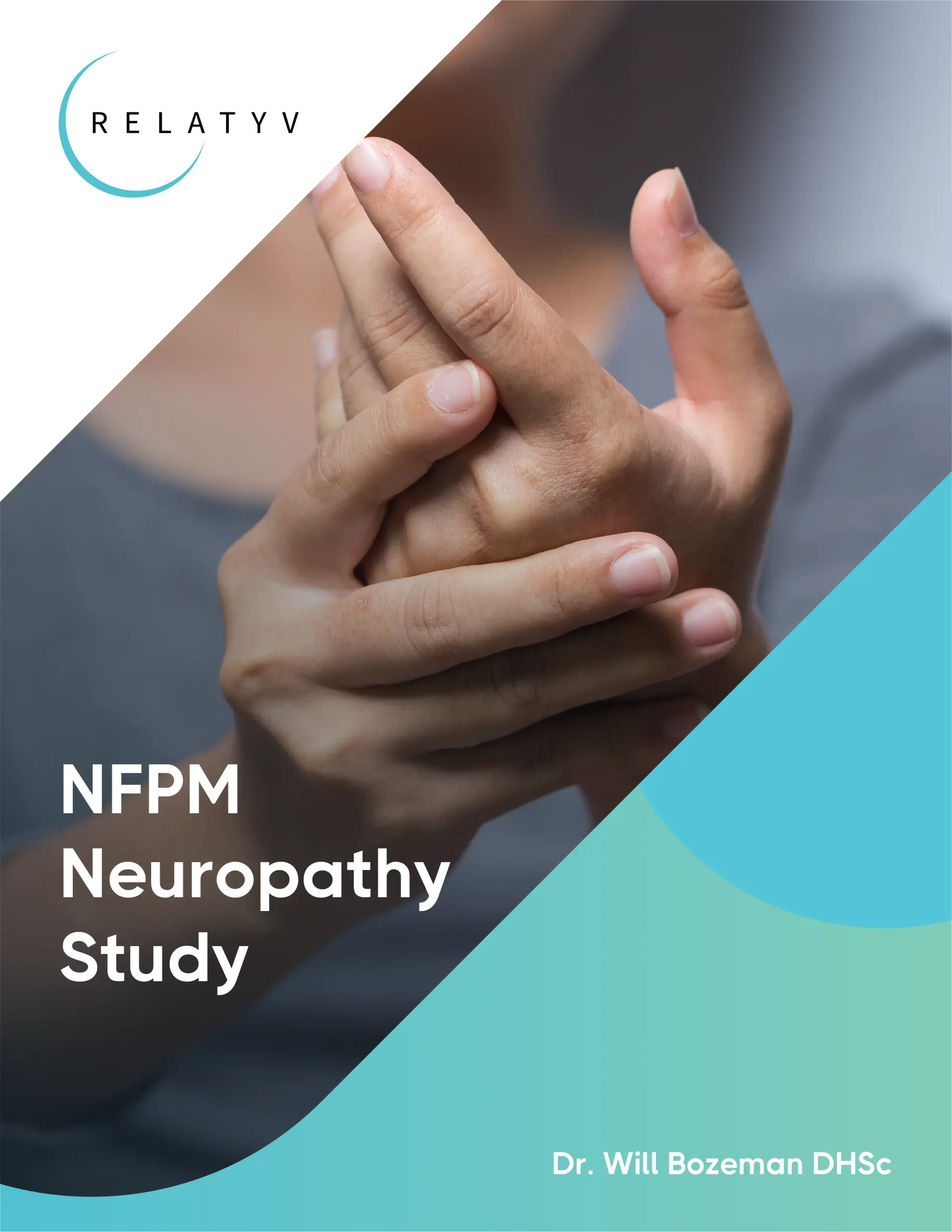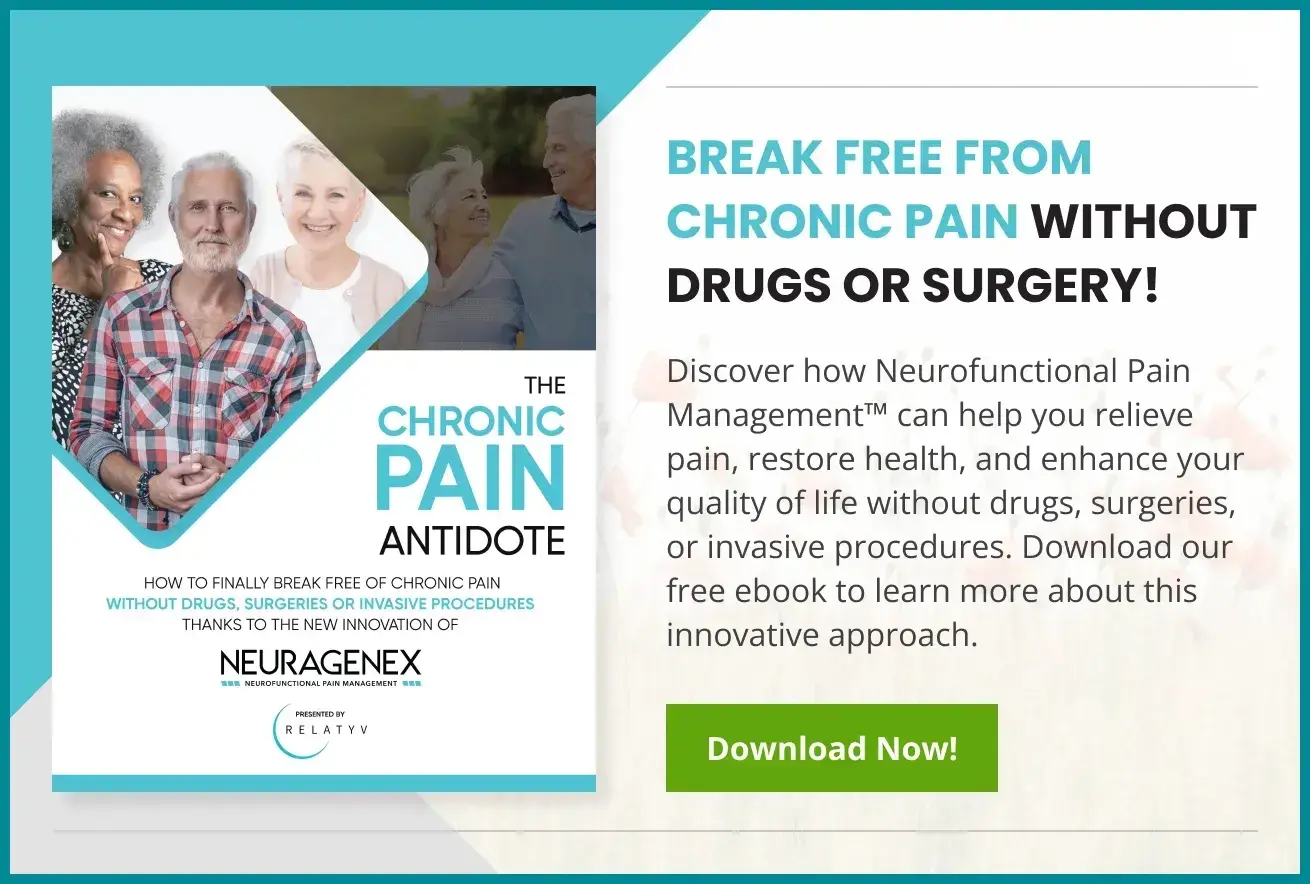Back Pain

How To Tell If Back Pain Is Muscle Or Disc
Read More
June 28, 2023
Heartburn is a common discomfort that many people experience at some point in their lives. It’s that burning sensation caused by indigestion, sometimes extending upwards toward the back of your throat. But did you know that heartburn can cause back pain?
Heartburn is commonly associated with the condition of acid reflux. This is when your stomach’s acidic fluid flows back up (the wrong way) into the esophagus, which causes the feeling of heartburn and irritation in the chest. However, the effects of acid reflux are not limited to the chest area alone. So, how can heartburn cause back pain?
In this article, we will explore heartburn as a symptom of acid reflux and explain how it connects to back pain. We’ll also look into the common causes of heartburn and acid reflux and some of the other symptoms to look out for.
Heartburn that causes back pain can be impairing if it is not well managed. We will discuss the standard treatment options available and known lifestyle modifications that can help you manage heartburn as a result of acid reflux.
Additionally, we’ll explore how Relatyv implements an alternative approach to managing heartburn-induced back pain, offering a different treatment option that doesn’t depend on the reliance on medications.
We hope to provide valuable insights to help you better understand heartburn and the frustrating back pain that it can cause, leading you to the treatment options that best suit your specific needs and desired lifestyle.
It’s likely that you have heard the two terms ‘heartburn’ and ‘acid reflux’ be used interchangeably, but did you know they both describe different things? Let’s discuss the connection between heartburn and acid reflux so we can have a better understanding of what body structures are involved and how symptoms emerge.
Let’s start by revisiting acid reflux. As previously mentioned, acid reflux is caused by the stomach’s digestive fluid taking a backward route and flowing back up into the esophagus. It is the harsh acidity of the digestive fluid that causes irritation to the esophagus and brings on the burning sensation, or as we call it, ‘heartburn.
This means that heartburn and its discomfort is a symptom of acid reflux, although heartburn doesn’t just affect the chest, pain can extend to other areas, including your back. So, how does acid reflux cause heartburn in the first place?
The esophagus is what connects your throat to your stomach; A muscular and tubular structure that contracts and relaxes to help food and drink pass through into your stomach. At the end of the esophagus, where it meets the stomach, is an important valve called the lower esophageal sphincter (LES).
The primary job of the LES is to keep the contents of the stomach, well, within the stomach, where it belongs. Although sometimes, the LES can falter and allow small portions of the acidic digestive fluid to pass back up into the esophagus.
Now we know the distinction between heartburn and acid reflux, let’s look into the effect acid reflux has on the esophagus and the surrounding structures and how it can lead to various symptoms emerging.
Stomach acid is designed to break down and digest our foods. It is then no surprise that when the LES falters and allows acid reflux to occur, the rogue stomach acid damages the lining of the esophagus, causing it to become irritated and inflamed. But how can acid reflux cause back pain when it affects your esophagus? Let us explain.
There is an extensive network of nerves that surrounds the esophagus, and they are important in sending communication signals to various parts of the body. When stomach acid damages the esophagus through acid reflux, it can directly impact these intricate nerves.
Consequently, signals of pain and discomfort are activated through this complex web, reaching various areas, such as the back. This is called ‘referred pain’ and explains why back pain can be associated with heartburn.
Now we have a greater insight into the underlying processes and mechanisms involved in how acid reflux, heartburn, and back pain are connected. Unfortunately, back pain is not the only frustrating symptom that is associated with heartburn from acid reflux. We will go on to highlight some of the other symptoms you might experience as a result of heartburn that is caused by acid reflux.
Other than back pain, there are a number of other problematic symptoms that can develop alongside heartburn that is caused by acid reflux. Let’s explore some of the other symptoms associated with this condition in more detail:
Quite an unpleasant symptom that accompanies heartburn due to acid reflux is an acidic taste in the mouth, often coupled with burping. This undesirable symptom happens because of the presence of stomach acid and partially digested food in the esophagus and mouth, resulting in a sour, bitter, acidic taste in the mouth and frequent burping.
Burping is a consequence of increased swallowing as your body attempts to clear the esophagus. Unfortunately, these symptoms can linger sometime after heartburn subsides.
The typical tell-tale sign of acid reflux is one we have already discussed, which is that firey, burning sensation in the chest described as heartburn. Caused by the stomach acid damaging the delicate lining of the esophagus, heartburn may feel like a squeezing, burning, tight sensation that can worsen when lying down or bending over.
If you have never experienced heartburn before or experience a particularly severe episode, it is not unreasonable to mistake this sensation for a heart-related condition.
Having a sound understanding of the underlying cause, triggers, and treatments for heartburn can help you distinguish the differences between heart-related pain and the burning sensation caused by acid reflux. Remember, if your symptoms get worse and you gain no relief from common treatments or are otherwise concerned, seek urgent medical attention.
Nausea is a common symptom that emerges as a result of heartburn from acid reflux. The urge to vomit and persistent nausea are a consequence of the inflamed esophagus caused by the rogue stomach acid.
The intensity of nausea may vary; however, it can prove debilitating when combined with the other discomforts of heartburn and back pain. It is important to get a proper diagnosis and evaluation from your healthcare provider if you experience persistent nausea with heartburn from acid reflux.
While these symptoms are commonly linked with heartburn due to acid reflux, it is important to recognize that symptoms can vary in severity and presentation among people. Some individuals might experience a combination of common symptoms, while others might notice their symptoms are not as typically associated with heartburn, such as back pain.
In the next section, we will discuss how you can better recognize back pain that is associated with heartburn. By having a deep understanding of all these diverse ways in which symptoms can manifest, you can identify and address the symptoms and underlying causes of heartburn more effectively.
While back pain is not as commonly experienced as the other symptoms of heartburn due to acid reflux, it can still cause considerable discomfort. It is important to be able to identify if your back pain is related to heartburn or a separate condition. We have outlined two of the key factors to help recognize if your back pain is associated with heartburn from acid reflux:
An episode of acid reflux and heartburn can cause a distinct burning sensation or dull ache in-between the shoulder blades and across the upper back. If this is where you are experiencing your back pain, it is suggestive that the underlying cause is heartburn from acid reflux. Taking the time to identify exactly where the back pain is located can be a helpful indicator of its underlying cause.
Back pain that is associated with heartburn and acid reflux will persist or worsen when lying down or bending over. These two body positions allow for an increased amount of stomach acid to pass through the LES into the esophagus and therefore exacerbate all symptoms of heartburn from acid reflux.
If the back pain you are experiencing worsens in either of these positions, it suggests that it is a symptom of heartburn.
Remember, it is essential to consult with your healthcare provider for a proper evaluation and diagnosis if you are experiencing severe back pain or additional symptoms such as stiffness, numbness, tingling, or pain that radiates to your arms.
Taking the time to observe your symptoms and piece together these important clues can be valuable when differentiating heartburn-related back pain from other causes. Additionally, it is important to note that heartburn can emerge from factors other than acid reflux. Now let’s go on to discuss some of the other common causes of heartburn and heartburn-related back pain.
So far, we have established that heartburn is a symptom of acid reflux, but acid reflux is not the only condition that can cause heartburn. Let’s go into detail about some of the other causes that can lead to heartburn and heartburn-related back pain.
By understanding these other potential causes of heartburn and heartburn-related back pain, it can be easier to identify the underlying cause of your symptoms and seek appropriate treatment with the help of a medical professional.
In the following section, we will delve into various treatment options and lifestyle modifications that can help alleviate the symptoms of heartburn caused by acid reflux. By implementing these strategies, you can take proactive steps toward finding relief from this painful and frustrating condition.
Conventional treatments for heartburn and heartburn-related back pain focus on managing the associated pain and discomfort while also avoiding factors that can trigger or worsen the symptoms. Outlined below are some of the more commonly suggested treatments and lifestyle approaches to managing this condition:
Over-the-counter medications are available to help manage symptoms of heartburn and heartburn-related back pain. It may be tempting to treat back pain with anti-inflammatories such as Ibuprofen, however, in the case of heartburn-related back pain, these medications may worsen your symptoms.
Non-steroidal anti-inflammatories (NSAIDs) can further irritate the lining of the esophagus and stomach, aggravating painful symptoms. Therefore, it is best to treat the underlying cause to get relief. Liquids and tablets such as Mylanta or Gaviscon can help neutralize stomach acid, providing temporary relief from heartburn and its symptoms, including back pain.
In more serious or chronic cases, prescription medication, including proton pump inhibitors (PPIs) and H2 blockers, can be prescribed to help reduce the overall production of stomach acid, therefore reducing the frequency of heartburn. These medications can be effective in providing short-term relief, but long-term use should be monitored and guided by a healthcare professional.
There are certain lifestyle modifications that can help prevent or significantly improve the symptoms of heartburn, including back pain. Consider implementing the following approaches for relief:
A number of foods and beverages can trigger heartburn and heartburn-related back pain. Although every individual’s experiences can differ, these foods often include foods that are overly spicy or fatty.
Additionally, foods that are higher in acidity, such as citrus fruits, chocolate, caffeine, and alcohol, can increase stomach acid and therefore worsen the symptoms of heartburn. By avoiding foods that trigger heartburn, you can reduce both its frequency and intensity, as well as any additional symptoms.
When you lie on your back, the stomach’s acid has an increased likelihood of flowing back up into the esophagus and causing heartburn and esophageal irritation. When sleeping and resting, elevate the head by a few inches to help prevent or alleviate the symptoms of heartburn, including back pain.
Holding excess weight increases the pressure being placed on the abdominal organs, such as the stomach. This increased pressure makes the backflow of stomach acid into the esophagus more likely.
By adopting a balanced diet and engaging in regular exercise, you can achieve and maintain a healthy weight, reducing the burden on your abdominal organs. This will help minimize heartburn episodes and eliminate the symptoms of acid reflux, including heartburn and heartburn-related back pain.
While these conventional treatment options can provide relief, it’s important to remember that individual responses may vary. For some people, finding effective relief from chronic acid reflux and its related symptoms is a significant challenge. Additionally, some individuals may want to avoid taking a number of over-the-counter or prescription medicine as a lifestyle preference.
In the next section, we will explore an alternative approach to managing heartburn-induced back pain and explore non-medication-based treatments that provide beneficial treatment options for individuals seeking alternative or complementary methods of relief.
Relatyv offers a comprehensive approach to managing heartburn-induced back pain by directly targeting symptoms at the underlying root cause. Our focus is on providing effective relief by addressing the complex nature of pain through the unique Neurofunctional Pain Management protocol (NFPM).
The NFPM protocol specifically targets the intricate connections between the brain and the nervous system’s perception of pain. By addressing the root causes of heartburn-induced back pain, our approach aims to provide long-lasting relief rather than just short-term management.
Unlike traditional treatment options, NFPM is a non-pharmaceutical and non-invasive approach that focuses on targeting and treating the underlying mechanisms involved in heartburn-induced back pain. It combines electroanalgesia, a painless therapy that stimulates the brain, nervous system, and pain pathways, with specialized hydration intravenous therapy (IV therapy).
Electroanalgesia interrupts pain signals, reduces inflammation and nerve irritation, and stimulates the release of natural endorphins, providing pain relief at a cellular level.
Simultaneously, IV therapy addresses nutritional deficiencies and promotes overall health by restoring essential nutrients and electrolytes to the bloodstream. This helps minimize inflammation, support organ function, and reduce the progression of heartburn symptoms, including back pain.
At Relatyv, we prioritize a safe and effective holistic approach to all of our treatment plans. As a part of the NFPM protocol, we are proud to offer comprehensive lifestyle counseling. Our lifestyle coaches help empower patients to maintain both their psychological and physical health, learning and adopting lifestyle strategies that achieve long-term pain relief.
Furthermore, our personalized approach to NFPM treatments for back pain is not limited to heartburn-related pain. We provide management plans that can address the underlying causes of back pain as a result of multiple conditions.
Managing heartburn and its associated symptoms, including back pain, can be challenging. Gaining an understanding of how heartburn occurs and recognizing its other related symptoms can be helpful in effectively identifying and addressing this potentially painful and frustrating condition.
A number of over-the-counter medications and lifestyle adaptations can be adequate for managing this condition by providing short-term relief from heartburn and its nagging back pain. By considering the Neurofunctional Pain Management protocol as a complementary option, individuals can take proactive steps toward regaining control over their health and finding relief.
Relatyv offers NFPM as an innovative and holistic approach to managing heartburn and heartburn-related back pain that does not solely rely on medicines. By targeting the underlying mechanisms, such as esophageal inflammation and nerve irritation caused by acid reflux, individuals can experience long-lasting relief and an improved quality of life.
About the Author
Will is a healthcare executive, innovator, entrepreneur, inventor, and writer with a wide range of experience in the medical field. Will has multiple degrees in a wide range of subjects that give depth to his capability as an entrepreneur and capacity to operate as an innovative healthcare executive.
Share on Social Media




You can see how this popup was set up in our step-by-step guide: https://wppopupmaker.com/guides/auto-opening-announcement-popups/
You can see how this popup was set up in our step-by-step guide: https://wppopupmaker.com/guides/auto-opening-announcement-popups/
Neurofunctional Pain Management Overview
Symptoms
Conditions Treated
Treatments
Articles by Category
Locations
Colorado
Wisconsin
Georgia
Hiram
Lawrenceville
Marietta
Powder Springs
Texas
Waco
Victoria
Illinois
Buffalo Grove
New Lenox
St. Charles
Arizona
Tucson
Waddell
Arlington
Avondale
Buckeye
Superior
Mesa
Palo Verde
Morristown
Tempe
Chandler
Anthem
Eloy
Florence
Fort McDowell
Phoenix
El Mirage
Coolidge
Gilbert
Arizona City
Casa Grande
Casa Blanca
Aguila
Sacaton
Apache Junction
Kearny
Stanfield
Goodyear
Litchfield Park
Alabama
Arkansas
California
Florida
Idaho
Indiana
Iowa
Kansas
Louisiana
Maryland
Michigan
Rhode Island
Minnesota
Mississippi
Nevada
New Jersey
New Mexico
North Carolina
Ohio
Pennsylvania
South Dakota
Tennessee
Utah
Virginia
Washington

